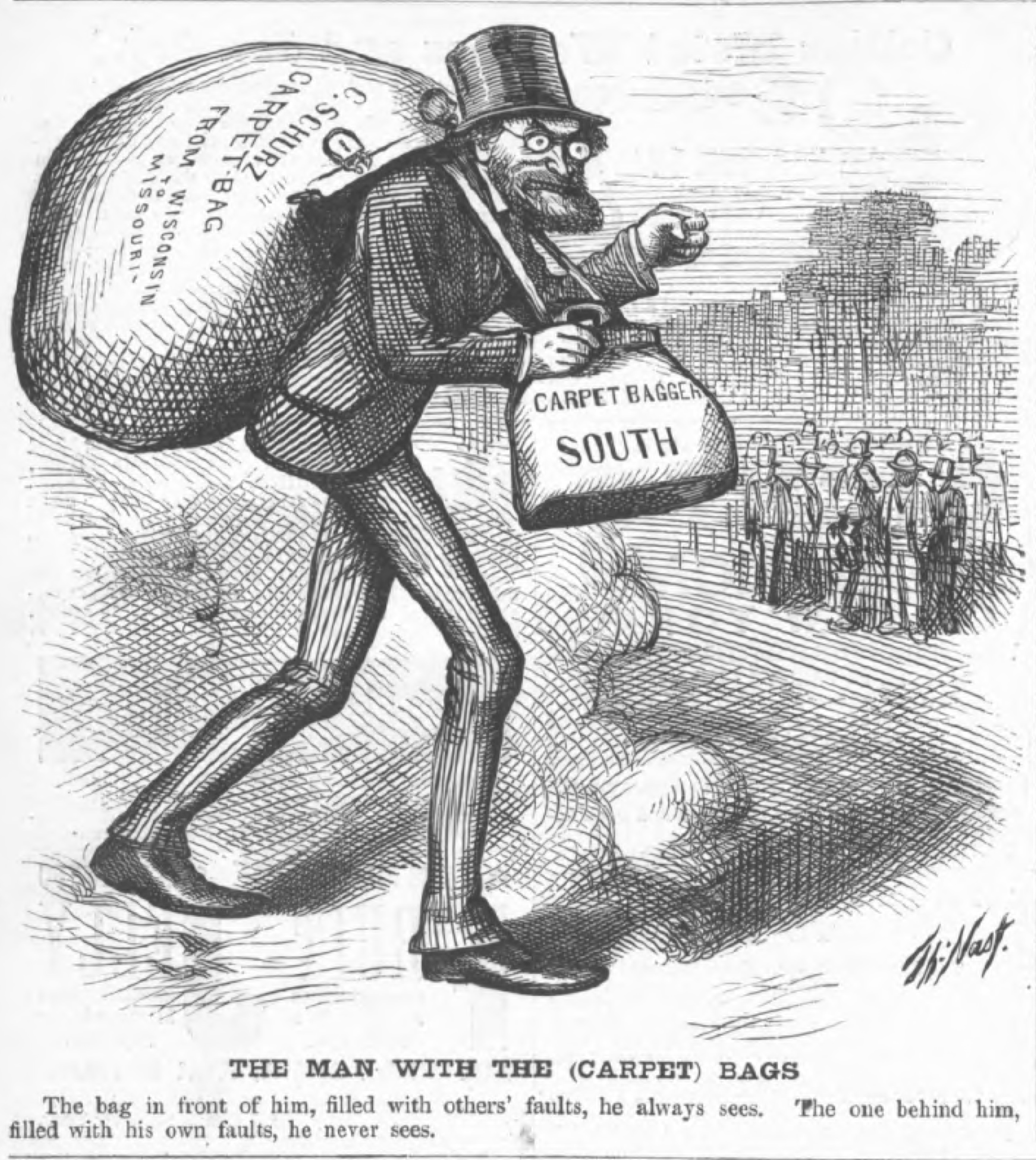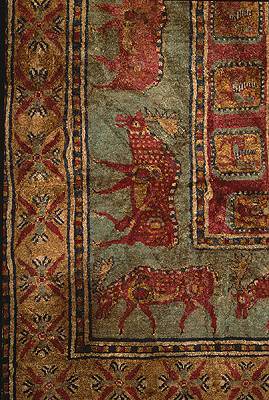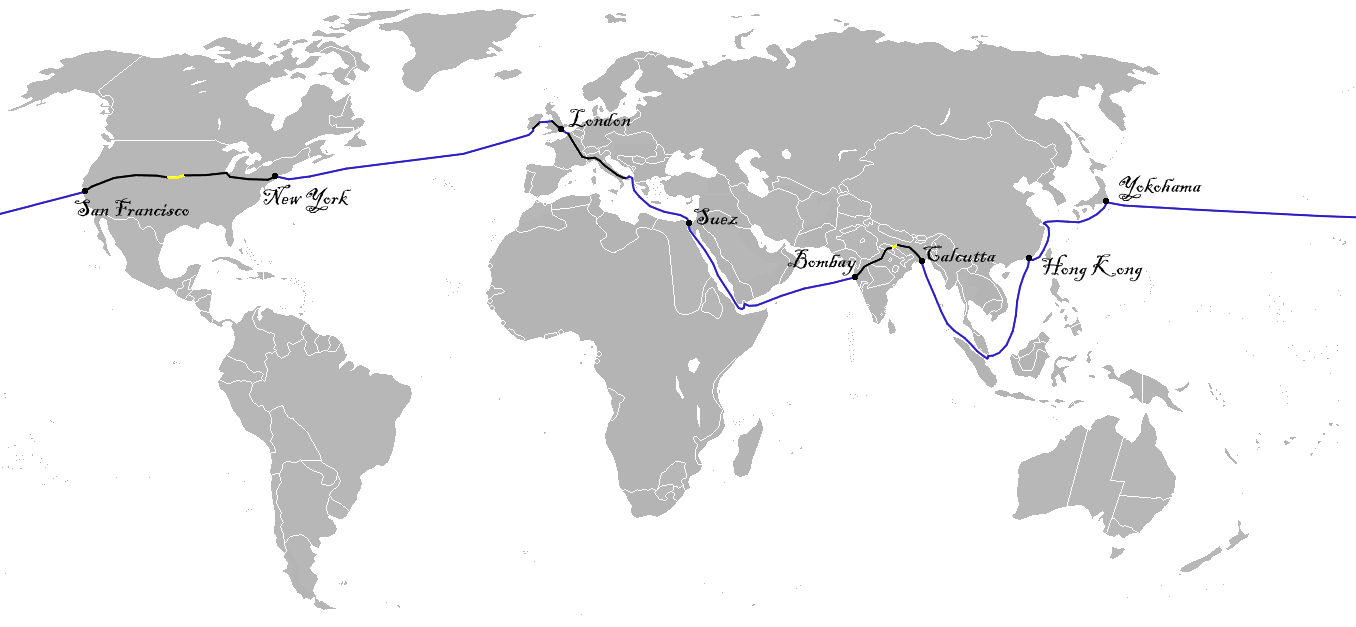|
Carpet Bag
A carpet bag is a top-opening travelling bag made of carpet, commonly from an oriental rug. It was a popular form of luggage in the United States and Europe in the 19th century, featuring simple handles and only an upper frame, which served as its closure. Some small modern versions are used as handbags or purses. The Reconstruction-era carpet bag illustrated is made from a remnant of Printed Tapestry Velvet Carpet (Whytock ; patent 1832, Edinburgh). Extant examples of this style of carpet can be seen at Hampton National Historic Site: National Park Service: Towson, Maryland, and Andrew Jacksons Hermitage in Nashville, Tennessee, USA. A United Kingdom extant installation can be seen at Burton Constable Hall, in Yorkshire. History The carpet bag was invented as a type of inexpensive personal baggage light enough for a passenger to carry, like a duffel bag, as opposed to a large rigid wooden or metal trunk, which required the assistance of porters. In 1886, the ''Scien ... [...More Info...] [...Related Items...] OR: [Wikipedia] [Google] [Baidu] |
Carpetbag
A carpet bag is a top-opening travelling bag made of carpet, commonly from an oriental rug. It was a popular form of luggage in the United States and Europe in the 19th century, featuring simple handles and only an upper frame, which served as its closure. Some small modern versions are used as handbags or purses. The Reconstruction-era carpet bag illustrated is made from a remnant of Printed Tapestry Velvet Carpet (Whytock ; patent 1832, Edinburgh). Extant examples of this style of carpet can be seen at Hampton National Historic Site: National Park Service: Towson, Maryland, and Andrew Jacksons Hermitage in Nashville, Tennessee, USA. A United Kingdom extant installation can be seen at Burton Constable Hall, in Yorkshire. History The carpet bag was invented as a type of inexpensive personal baggage light enough for a passenger to carry, like a duffel bag, as opposed to a large rigid wooden or metal trunk, which required the assistance of porters. In 1886, the ''Scien ... [...More Info...] [...Related Items...] OR: [Wikipedia] [Google] [Baidu] |
Jules Verne
Jules Gabriel Verne (;''Longman Pronunciation Dictionary''. ; 8 February 1828 – 24 March 1905) was a French novelist, poet, and playwright. His collaboration with the publisher Pierre-Jules Hetzel led to the creation of the ''Voyages extraordinaires'', a series of bestselling adventure novels including ''Journey to the Center of the Earth'' (1864), ''Twenty Thousand Leagues Under the Seas'' (1870), and '' Around the World in Eighty Days'' (1872). His novels, always well documented, are generally set in the second half of the 19th century, taking into account the technological advances of the time. In addition to his novels, he wrote numerous plays, short stories, autobiographical accounts, poetry, songs and scientific, artistic and literary studies. His work has been adapted for film and television since the beginning of cinema, as well as for comic books, theater, opera, music and video games. Verne is considered to be an important author in France and most of Europe, where ... [...More Info...] [...Related Items...] OR: [Wikipedia] [Google] [Baidu] |
American Civil War
The American Civil War (April 12, 1861 – May 26, 1865; also known by other names) was a civil war in the United States. It was fought between the Union ("the North") and the Confederacy ("the South"), the latter formed by states that had seceded. The central cause of the war was the dispute over whether slavery would be permitted to expand into the western territories, leading to more slave states, or be prevented from doing so, which was widely believed would place slavery on a course of ultimate extinction. Decades of political controversy over slavery were brought to a head by the victory in the 1860 U.S. presidential election of Abraham Lincoln, who opposed slavery's expansion into the west. An initial seven southern slave states responded to Lincoln's victory by seceding from the United States and, in 1861, forming the Confederacy. The Confederacy seized U.S. forts and other federal assets within their borders. Led by Confederate President Jefferson Davis, ... [...More Info...] [...Related Items...] OR: [Wikipedia] [Google] [Baidu] |
Reconstruction Era
The Reconstruction era was a period in American history following the American Civil War (1861–1865) and lasting until approximately the Compromise of 1877. During Reconstruction, attempts were made to rebuild the country after the bloody Civil War, bring the former Confederate states back into the United States, and to redress the political, social, and economic legacies of slavery. During the era, Congress abolished slavery, ended the remnants of Confederate secession in the South, and passed the 13th, 14th, and 15th Amendments to the Constitution (the Reconstruction Amendments) ostensibly guaranteeing the newly freed slaves (freedmen) the same civil rights as those of whites. Following a year of violent attacks against Blacks in the South, in 1866 Congress federalized the protection of civil rights, and placed formerly secessionist states under the control of the U.S. military, requiring ex-Confederate states to adopt guarantees for the civil rights of free ... [...More Info...] [...Related Items...] OR: [Wikipedia] [Google] [Baidu] |
Carpetbagger
In the history of the United States, carpetbagger is a largely historical term used by Southerners to describe opportunistic Northerners who came to the Southern states after the American Civil War, who were perceived to be exploiting the local populace for their own financial, political, and/or social gain. The term broadly included both individuals who sought to promote Republican politics (including the right of African Americans to vote and hold office) and individuals who saw business and political opportunities because of the chaotic state of the local economies following the war. In practice, the term ''carpetbagger'' was often applied to any Northerners who were present in the South during the Reconstruction Era (1865–1877). The term is closely associated with "scalawag", a similarly pejorative word used to describe native white Southerners who supported the Republican Party-led Reconstruction. White Southerners commonly denounced "carpetbaggers" collectively durin ... [...More Info...] [...Related Items...] OR: [Wikipedia] [Google] [Baidu] |
Hippie
A hippie, also spelled hippy, especially in British English, is someone associated with the counterculture of the 1960s, originally a youth movement that began in the United States during the mid-1960s and spread to different countries around the world. The word '' hippie'' came from '' hipster'' and was used to describe beatniks who moved into New York City's Greenwich Village, in San Francisco's Haight-Ashbury district, and Chicago's Old Town community. The term ''hippie'' was used in print by San Francisco writer Michael Fallon, helping popularize use of the term in the media, although the tag was seen elsewhere earlier. The origins of the terms ''hip'' and ''hep'' are uncertain. By the 1940s, both had become part of African American jive slang and meant "sophisticated; currently fashionable; fully up-to-date". The Beats adopted the term ''hip'', and early hippies inherited the language and countercultural values of the Beat Generation. Hippies created their own communit ... [...More Info...] [...Related Items...] OR: [Wikipedia] [Google] [Baidu] |
Robert Louis Stevenson
Robert Louis Stevenson (born Robert Lewis Balfour Stevenson; 13 November 1850 – 3 December 1894) was a Scottish novelist, essayist, poet and travel writer. He is best known for works such as ''Treasure Island'', ''Strange Case of Dr Jekyll and Mr Hyde'', '' Kidnapped'' and ''A Child's Garden of Verses''. Born and educated in Edinburgh, Stevenson suffered from serious bronchial trouble for much of his life, but continued to write prolifically and travel widely in defiance of his poor health. As a young man, he mixed in London literary circles, receiving encouragement from Andrew Lang, Edmund Gosse, Leslie Stephen and W. E. Henley, the last of whom may have provided the model for Long John Silver in ''Treasure Island''. In 1890, he settled in Samoa where, alarmed at increasing European and American influence in the South Sea islands, his writing turned away from romance and adventure fiction toward a darker realism. He died of a stroke in his island home in 1894 at ... [...More Info...] [...Related Items...] OR: [Wikipedia] [Google] [Baidu] |
Oriental Rug
An oriental rug is a heavy textile made for a wide variety of utilitarian and symbolic purposes and produced in " Oriental countries" for home use, local sale, and export. Oriental carpets can be pile woven or flat woven without pile, using various materials such as silk, wool, and cotton. Examples range in size from pillows to large, room-sized carpets, and include carrier bags, floor coverings, decorations for animals, Islamic prayer rugs ('Jai'namaz'), Jewish Torah ark covers (''parochet''), and Christian altar covers. Since the High Middle Ages, oriental rugs have been an integral part of their cultures of origin, as well as of the European and, later on, the North American culture. Geographically, oriental rugs are made in an area referred to as the “Rug Belt”, which stretches from Morocco across North Africa, the Middle East, and into Central Asia and northern India. It includes countries such as northern China, Tibet, Turkey, Iran, the Maghreb in the west, the Cauca ... [...More Info...] [...Related Items...] OR: [Wikipedia] [Google] [Baidu] |
Passepartout (character)
Jean Passepartout () is a fictional character in Jules Verne's novel '' Around the World in Eighty Days'', published in 1873. He is the French valet of the novel's English main character, Phileas Fogg. His surname translates literally to "goes everywhere", but “passepartout” is also an idiom meaning "skeleton key" in French. It can also be understood as a play on the English word '' passport''—-or it’s French equivalent —-and on the French word (everywhere). Fictional biography At the beginning of the novel, Passepartout has just been hired by Phileas Fogg after Fogg's previous valet failed to meet his exacting standards on 2 October 1872 at twenty eight minutes past eight. Passepartout, who has lived an irregular and well-travelled life, is looking forward to a restful employment, as Fogg is known for his regular habits which never take him further afield than the Reform Club. Ironically, on Passepartout's first day at work, Fogg makes a bet with his friends at the ... [...More Info...] [...Related Items...] OR: [Wikipedia] [Google] [Baidu] |
Phileas Fogg
Phileas Fogg () is the protagonist in the 1872 Jules Verne novel ''Around the World in Eighty Days''. Inspirations for the character were the American entrepreneur George Francis Train and American writer and adventurer William Perry Fogg. Fictional biography Fogg is a man of independent means and is a gentleman who is "exact", as in has a perfect and a routine life right down to the number of steps he walks to the temperature of his shaving water. Having fired a servant for the latter, he hires Jean Passepartout as a new servant. Fogg makes a wager of £20,000 (£2.4 million in 2022) with members of London's Reform Club that he can circumnavigate the world in 80 days or less. He sets out with his French servant Jean Passepartout to win the wager, unaware that he is being followed by a detective named Fix, who suspects Fogg of having robbed the Bank of England. Fix spends the first half of the book trying to delay Fogg's journey to keep him in British territory, However, afte ... [...More Info...] [...Related Items...] OR: [Wikipedia] [Google] [Baidu] |
Around The World In Eighty Days
''Around the World in Eighty Days'' (french: link=no, Le tour du monde en quatre-vingts jours) is an adventure novel by the French writer Jules Verne, first published in French in 1872. In the story, Phileas Fogg of London and his newly employed French valet Passepartout attempt to circumnavigate the world in 80 days on a wager of £20,000 set by his friends at the Reform Club. It is one of Verne's most acclaimed works. Plot Phileas Fogg is a wealthy English gentleman living a solitary life in London. Despite his wealth, Fogg lives modestly and carries out his habits with mathematical precision. Very little can be said about his social life other than that he is a member of the Reform Club, where he spends the best part of his days. Having dismissed his valet for bringing him shaving water at a temperature slightly lower than expected, Fogg hires Frenchman Jean Passepartout as a replacement. On the evening of 2 October 1872, while at the Reform Club, Fogg gets involved in an a ... [...More Info...] [...Related Items...] OR: [Wikipedia] [Google] [Baidu] |





